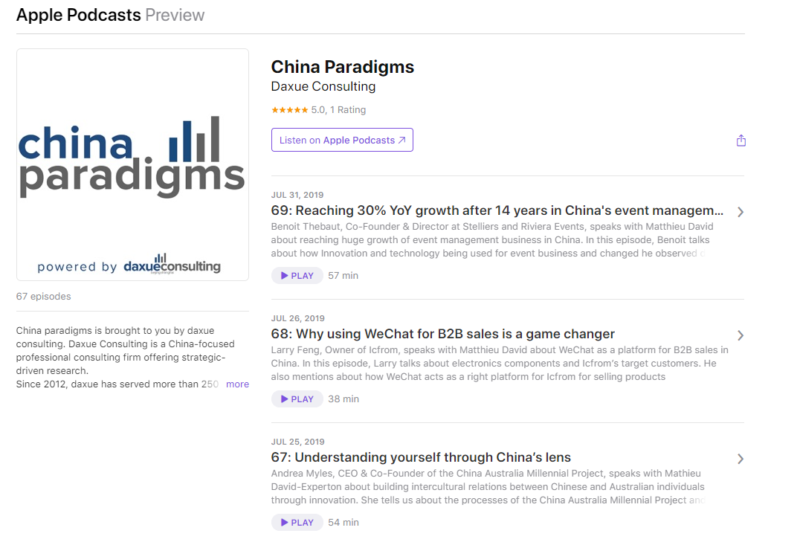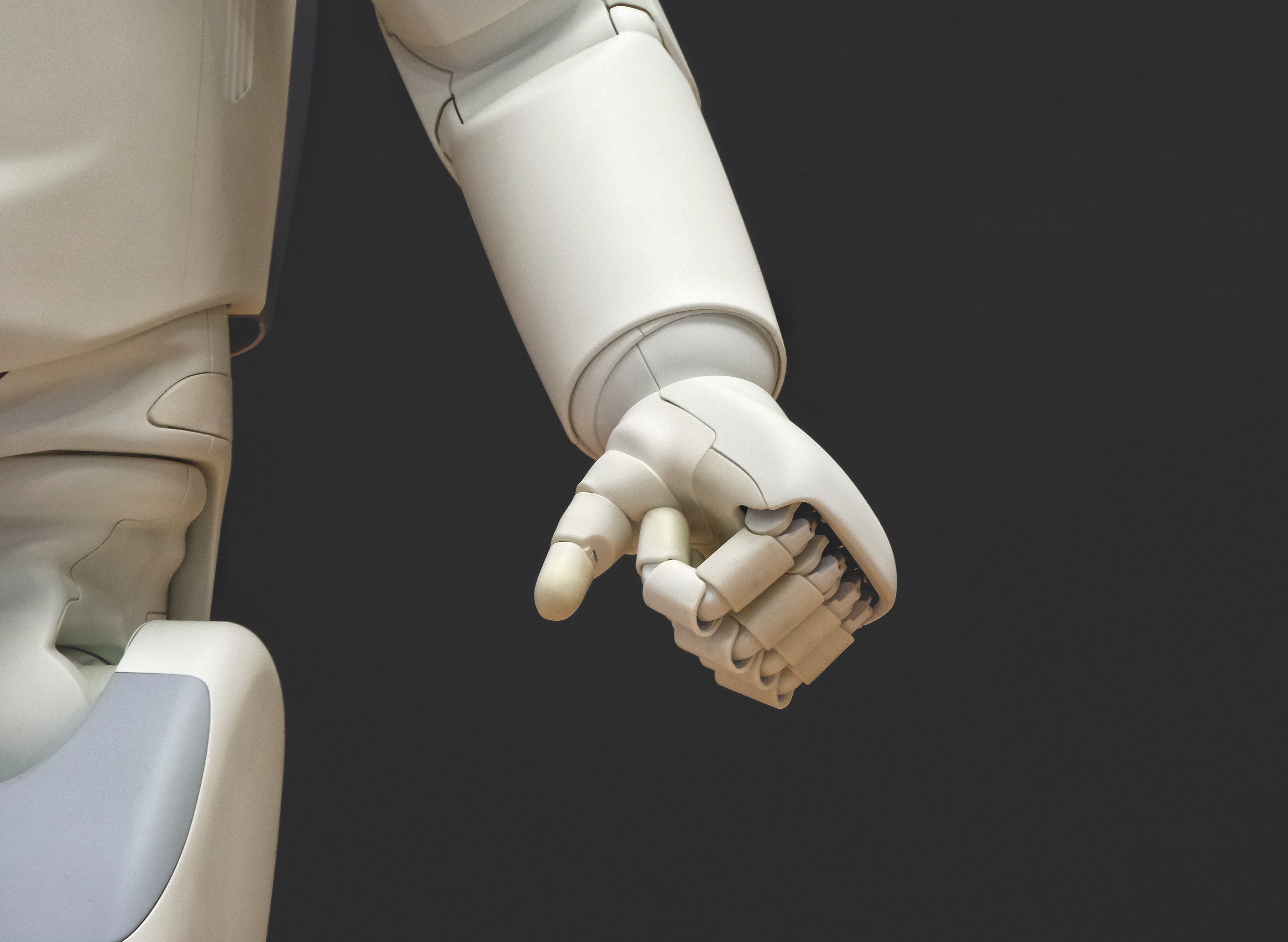Along with the gradual maturation of China’s artificial intelligence (AI) technology observed in recent years, many industry giants progressively increased their investment in this new market. The burgeoning applications related to AI technology have also expanded the scope of this technology from niche research fields to broader commercial areas. In fact, today, AI in China has broad market prospects. Besides being among the leading nations—in terms of AI research output, China is also ideally placed for the rapid development of AI technology. With its population of 1.4 billion and some of the world’s foremost research centers in the field like Tsinghua University, Shanghai Jiaotong University and the Chinese Academy of Sciences, China disposes of enough data and brainpower to make significant breakthroughs in AI technology.
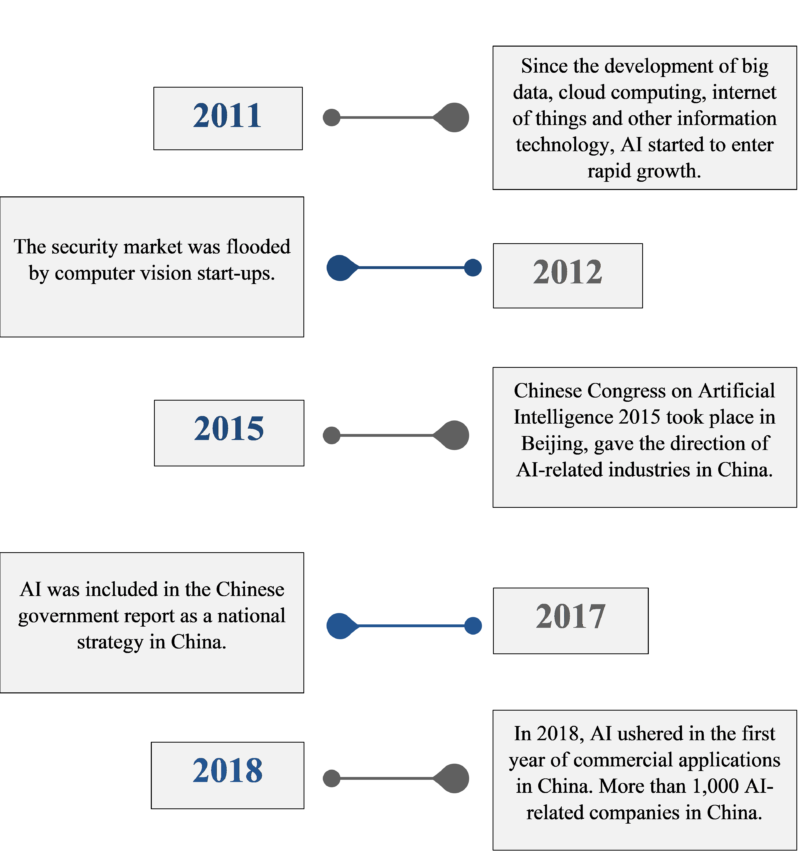
AI in China 2020
A re-occurring question is what China’s place is in the global realm of AI development. We are often bombarded with headlines pitting China against the US in competition. But after reviewing the AI developments that have happened in recent years, it is apparent that Chinese AI developers are eager for collaboration.
China’s high level of AI adoption and citizens’ positive perception towards AI sets it apart from other nations. China has the advantages of a massive data pool and a high level of adoption. The areas where China can improve are in talent, hardware and research quality.
AI Talent in China
Whereas the US and EU get a lot of AI talent from foreign countries, China is finding talent within its borders. Between 1998 and 2017 the US gained 1,283 foreign AI academic researchers while China only gained 53. However, China has a larger population to work with, and it is a population that is becoming increasingly more educated.
China is already working on more initiatives to increase AI-related education at the University level. In 2018, China’s ministry of education announced a plan to promote AI education, and several top universities have already added AI departments and majors. Due to China’s AI having a shorter history, AI researchers in China, on average, have less experience. 25% of Chinese AI workers have more than 10 years of experience compared to 50% of the US AI workers.
Highest quantity of AI research
China has published the highest quantity of AI research globally. Though Chinese papers are cited significantly less than US and EU papers, the quality of research has been increasing. Each year more and more AI papers globally cite Chinese research.
China is investing in improving the quality of AI research, three initiatives are:
1) China’s New Generation AI Development Plan, which calls for China to have made significant breakthroughs in AI theory by 2025
2) The Chinese government has created research centers, including the Artificial Intelligence Research Center, which has more than 100 employees.
3) The Chinese Ministry of Industry and Information Technology plans to allocate $950 million annually to fund strategic AI projects.
China’s AI influence is expanding globally
The amount of collaboration between American and Chinese AI researchers peaked in 2017, but is still much higher than it was five years ago. One thing that has been holding Chinese researchers back from collaborating with the US is visa rejections. Meanwhile, Chinese AI research collaborations with the EU have gone up since 2018.
One example of US-China AI collaboration happening in the medical industry, notably, a team of American and Chinese medical scientists made technology that can automatically diagnose common childhood diseases, thanks to the high volume of easily available data in China.
Microsoft, Intel, and Tencent even participated in a cucumber-growing competition to operate autonomous greenhouses to explore artificial intelligence applications in indoor farming.
Baidu, Alibaba, Tencent internationalizing their AI operations
Despite the US and China being pitted as AI enemies, companies have been reaching cross-border for collaborations and mutual gain. Baidu has been reaching across borders for AI collaboration, Alibaba is entering foreign markets through B2B e-commerce, and Tencent is spreading it’s influence through investments in gaming companies.
Baidu
Baidu has joined a consortium led by US companies advancing the understanding of AI globally. Baidu has also been developing ad tech in Silicon Valley and has launched a DU Ad platform with a goal to help developers in China and elsewhere increase their mobile profits in overseas countries.
Baidu has entered foreign markets through utility apps. These are apps that are not exciting to neither create nor download, but they are useful and sticky, think phone battery savers, spam call filters, screen capture apps.
Alibaba
Alibaba is taking a path of B2B cross-border e-commerce, for example it recently partnered with US’s Office Depot for a B2B campaign targeting America’s small to medium sized businesses. This B2B path avoids direct competition with Amazon for the time being.
Tencent
Tencent has been investing in video game companies around the world. Tencent has purchased 100% of Riot Games, an American game developer most famous for League of Legends. Tencent has purchased 40% of Riot Games, famous for Fortnite, has 5% stake in Activision Blizzard. In addition to these two American gaming companies, Tencent also has stake in South Korea’s Bluehole and France’s Ubisoft, and many more game companies around the world.
AI investment between the west and China
The amount of cross-border AI-focused investment between the US and China is increasing, but there are more Chinese investments in AI startups in the US than vice-versa. Chinese AI investment in the US and US AI investment in China both peaked in 2017.
According to CB Insights’ data, between 2014 and 2018 there were almost as much BAT-backed equity deal shares in the US as there was in China. Some BAT-backed investments in the US include Atomwise, Lightintelligence, ZestFinance and ObEN. The US facial recognition startup CloudWalk even received a $301M grant from the Guangzhou Municipal Government.
On the flip side, Microsoft is an example of a western country with a strong AI presence in China. With a research lab that has been present in China since 1999, Microsoft has hired and trained thousands of Chinese AI developers.
The main sectors covered by AI in China
Delving into the AI market in China, we see that this technology already covers a wide range of segments. Some of the most dynamic areas include what Daxue Consulting defines as the basic layer—the basic parts and algorithms of AI products; the technology layer—technology which support AI products—and applications, which are the AI products in the different industries. In the graph below, we have clustered Chinese companies which make use of AI technology into four groups, depending on which specific segment the companies focus on: Applications, Technology, Basic, and Comprehensive, which refers to those companies that are working in all three areas.
China’s Artificial Intelligence companies
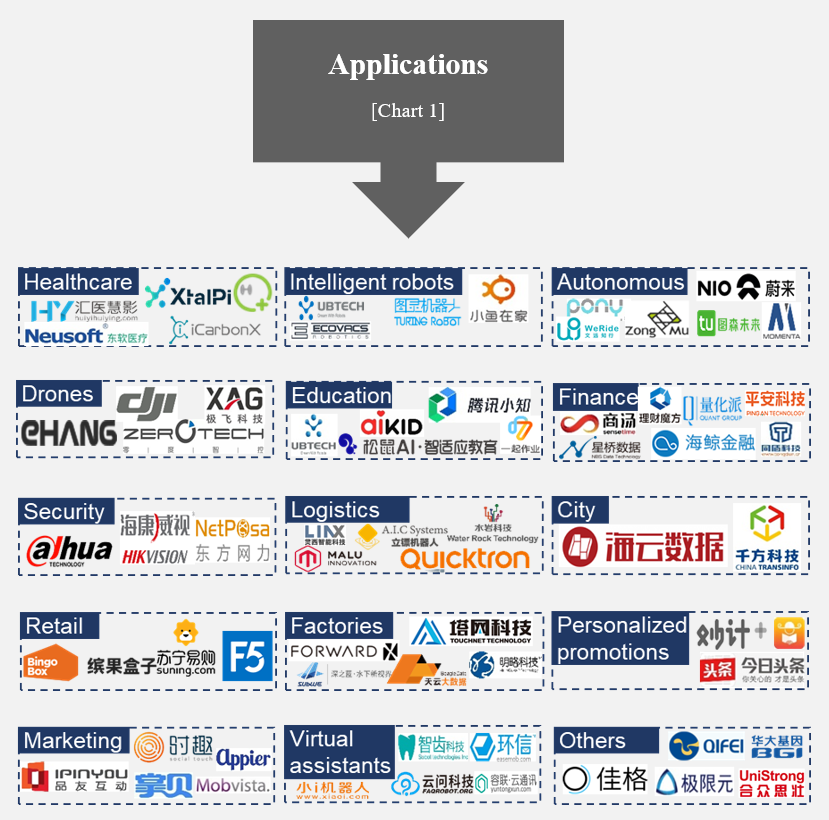
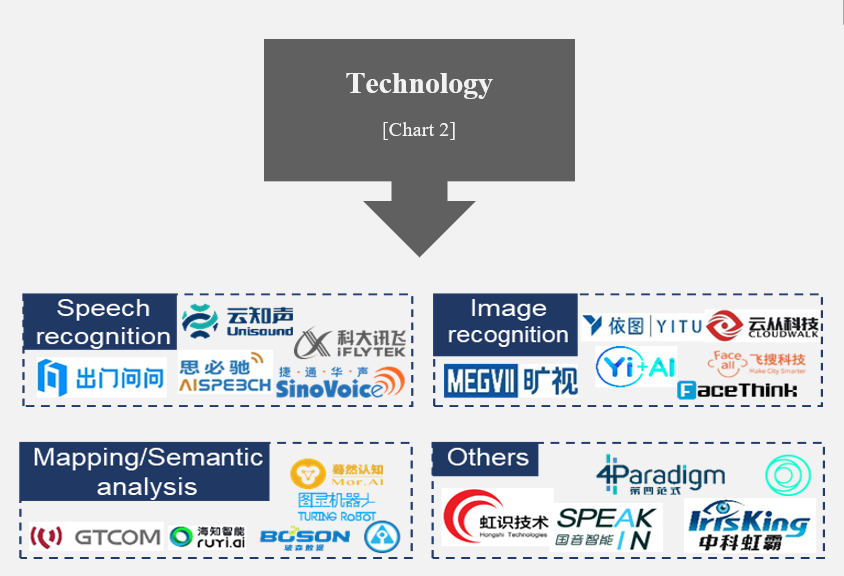
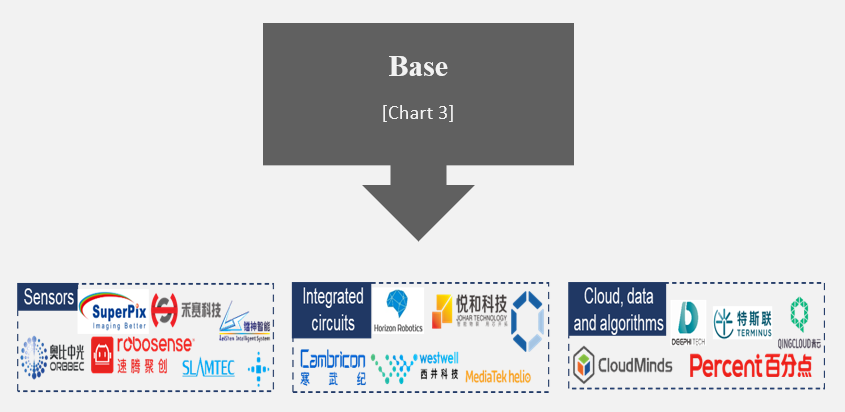
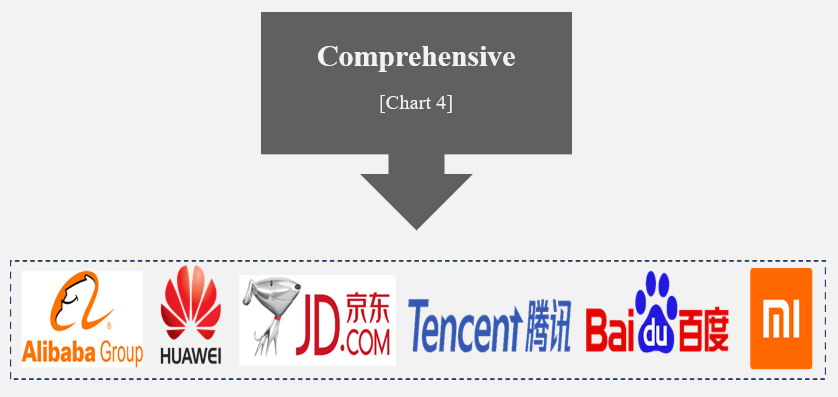
Market size of AI technology in China
China’s artificial intelligence industry is becoming one of the most important markets in the nation. However, the market of AI in China is not mature yet, there is still a large space for development. In 2018, the size of China’s artificial intelligence market reached 33.9 billion RMB and the compound annual growth rate (CAGR) was more than 44% between 2015 and 2018. By 2020, the market size is expected to reach 71 billion RMB.
China’s Artificial intelligence by market size
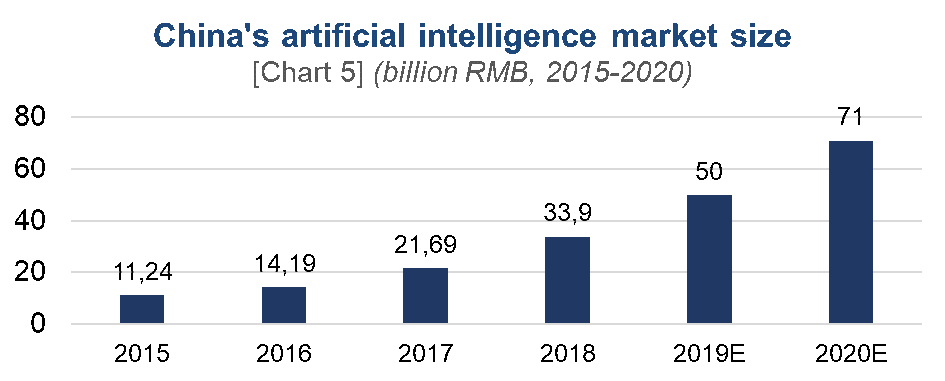
Distribution of AI companies by industries
The AI-related companies established in 2018 mainly belong to the security, speech interaction and healthcare industries. These areas have strong market demand and mature technology applications. A large portion of China’s AI market share is from speech, computer vision and natural language processing technology.
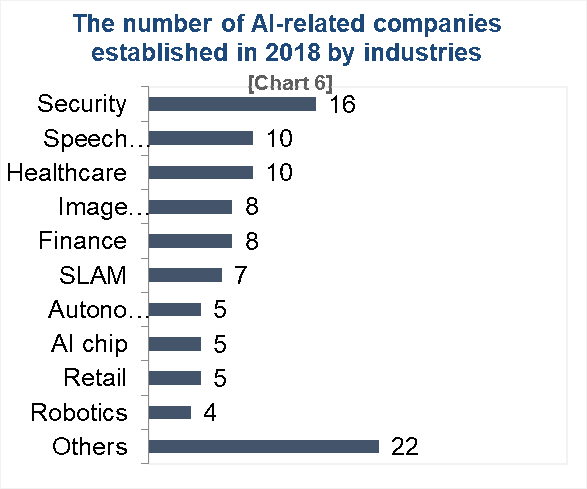
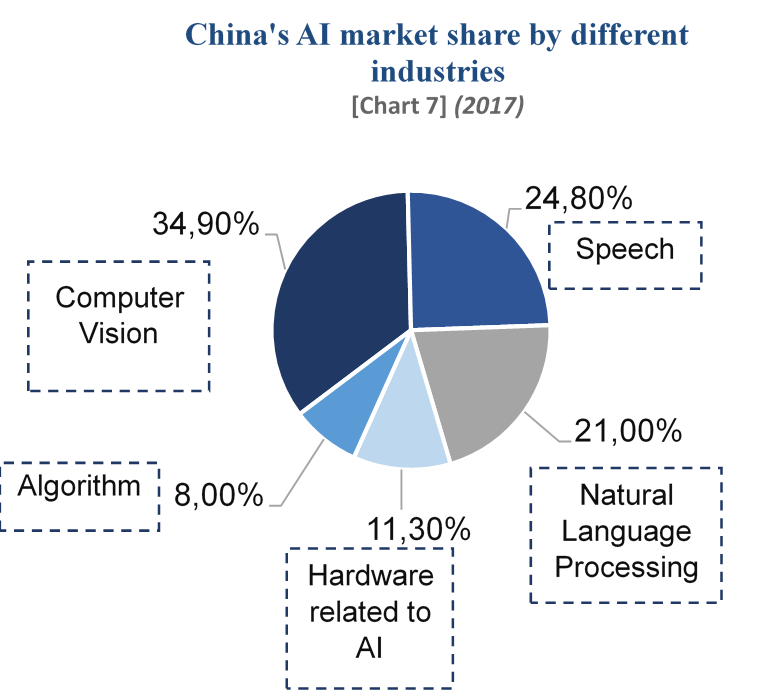
Distribution of AI startups by region
AI companies in China are mainly concentrated in the economically developed first and second-tier cities and coastal areas. Inland provinces are trying to grasp the development boom as well. In addition, Beijing, Shanghai, Shenzhen and Hangzhou are ranked among the Top20 in the world for the quantity and industrial output of AI companies. As a result of its large and talented workforce, industrial resources and capital, which were superior to other regions and cities, Beijing recorded the highest number of AI companies in China.
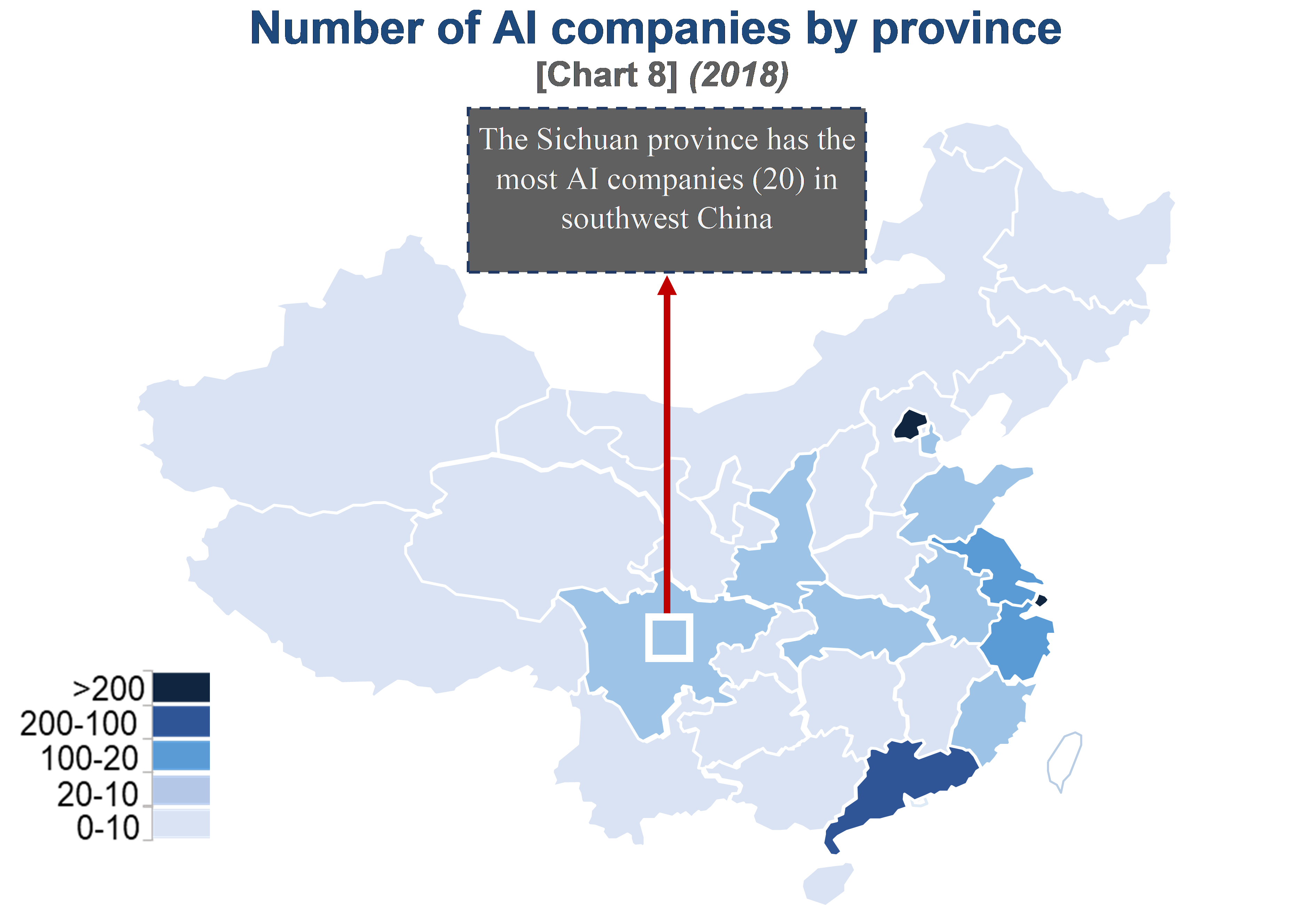
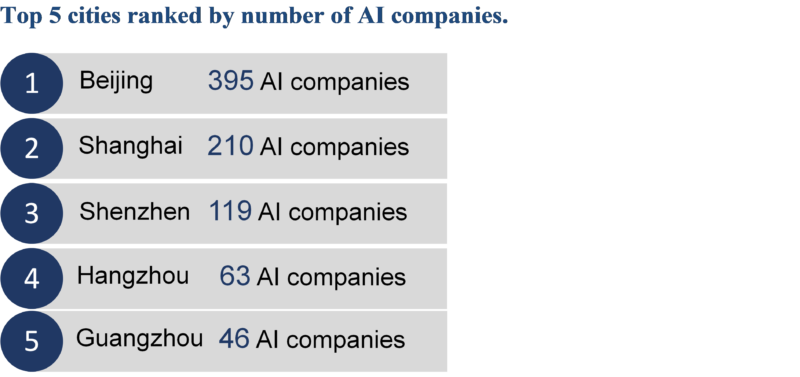
Investments in AI technology in China
In 2018, the investment value in China’s AI industry reached 131.1 billion RMB, which is an increase of about 67.7 billion RMB compared to 2017. The scale of this investments granted China the first position in the world ranking. Although the growth of AI financing events slowed down in 2018, the total investment value still increased significantly. Large financing events occurred frequently, and capital was more concentrated in leading companies.
The value of China’s AI industry
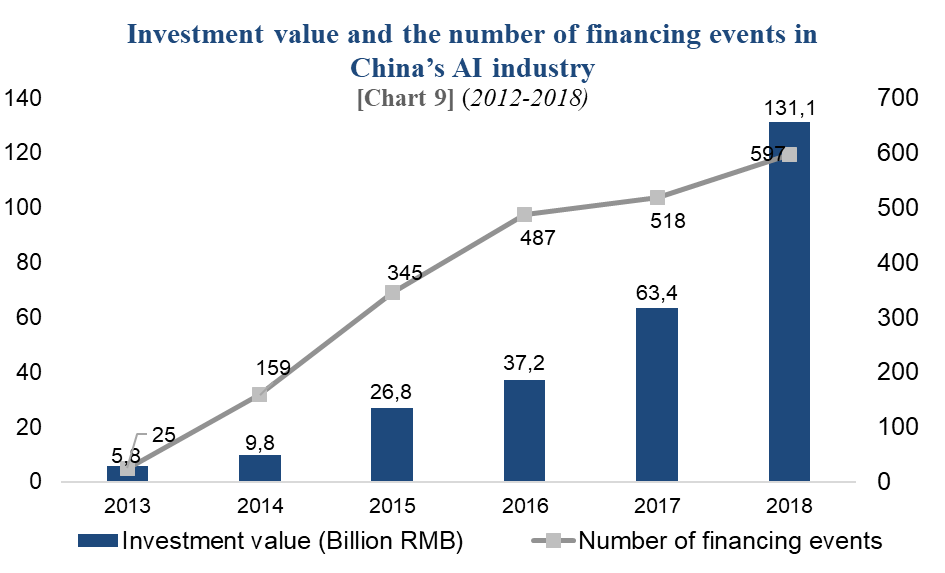
Why AI technology is developing so fast in China?
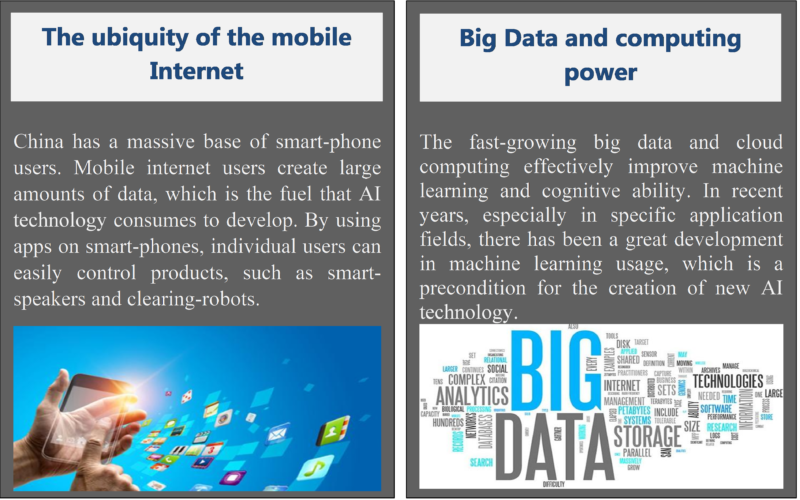
TECH PARKS
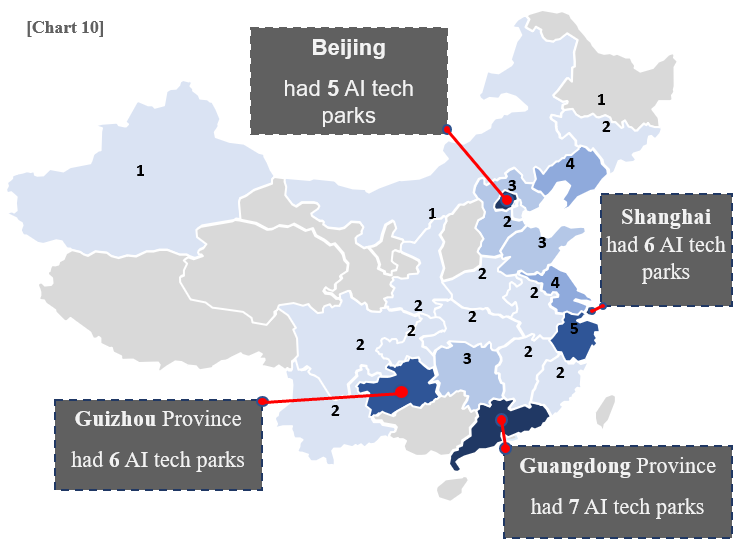
In order to promote AI’s development, the Chinese government launched a series of AI industrial parks in the eastern and southern parts of the country. In 2018, China had more than 60 AI tech parks. Industrial parks usually have preferential policies to attract AI companies, such as rental subsidies and tax concessions.
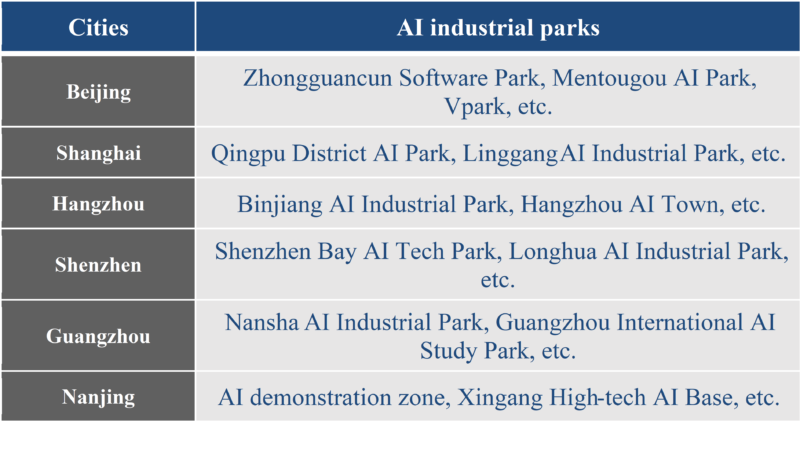
Chinese perceptions of AI
An important element in the development of AI technology is the potential perception that consumers have of AI based products. More often than not, the cocktail of information that has been surrounding AI research and its applications has created confusion among lay readers. In fact, catastrophist Hollywood movies like Terminator, or the nefarious predictions of famous entrepreneurs like Elon Musk come to the mind of many people, whenever they hear or read about artificial intelligence.
In order to get an idea of what Chinese netizens think of AI, the statistical Daxue Consulting conducted a sentiment analysis on the platform Zhihu. Zhihu is the first Q&A website in China and has transitioned to a social media sharing platform, gathering more than 100 million answers on various topics. The platform is especially relevant for inquiries regarding higher- and well-educated social classes.
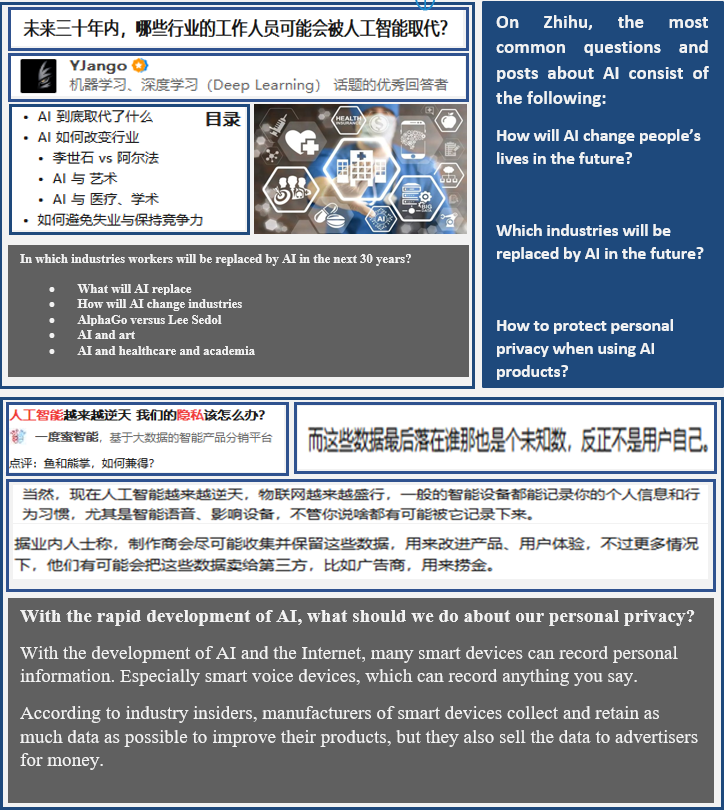
Netizen’s perception of AI
In addition to the sentiment analysis conducted on Zhihu, the statistical department of Daxue consulting has conducted online analyses of other popular online platforms like WeChat and Weibo. In particular, we focused our research on the reasons netizens give for perceiving AI as having a positive or negative impact on their lives and the society in general.
Positive perception of AI
According to internet users, AI can play a very important role in facilitating the daily life of citizens. Some of the reasons that are most frequently cited on Weibo and Wechat for embracing the introduction of AI technology in the society are the following:
- AI can help to improve traffic conditions and reduce the occurrence of road accidents
- AI can improve the diagnosis and treatment efficiency in the healthcare industry
- AI can promote the innovation of teaching methods
WeChat is the first instant messaging platform in China by number of users and an absolute must-have for any company seriously interested in market entry promotion. As of 2019, it accounts for over 1 billion active users and as more and more non-Chinese users adopt WeChat as a medium of communication this figure is poised to grow in the future.
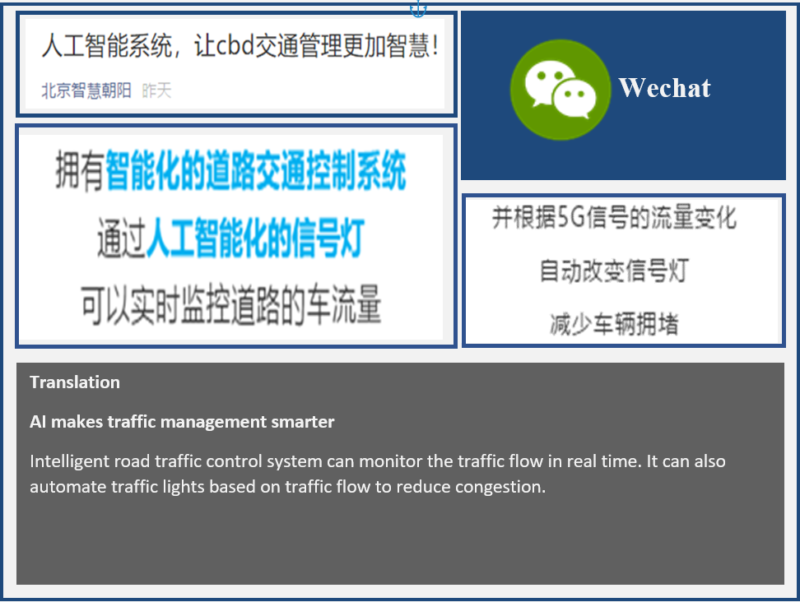
Sina Weibo, or simply referred to as Weibo, is the name of the largest microblogging platform in China. The website was launched on the 14th of August, 2009 by Sina Corporation, which among others manages the internet portal Sina.com. The term Weibo is the literal translation of the Chinese word 微博 (Wēibó), which means microblog.
In 2014, before its listing on the NASDAQ stock market, the company changed the name of the platform from the original “Sina Weibo” to “Weibo”. This decision was taken as a way for Sina Corporation to differentiate its product from competitors like Tencent Weibo, which is best known as QQ. The Functionalities available on Weibo persuaded many to define it as the Chinese equivalent of Twitter.
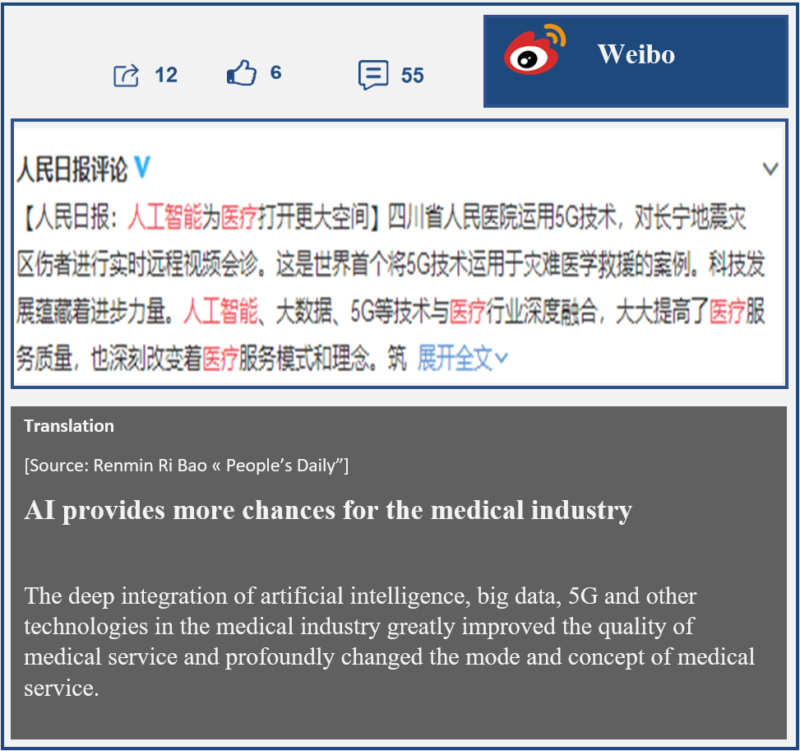
Fears of AI on Weibo & WeChat
Despite the many positive opinions on AI that internet users share, some reservations regarding the more nefarious side of AI have emerged all social groups. The following are some of the more common that we have come across:
- AI could cause social problems, such as mass unemployment in some industries.
- AI brings challenges to personal information protection.
- Autonomous driving technology cannot deal with emergencies with the same urgency as humans.
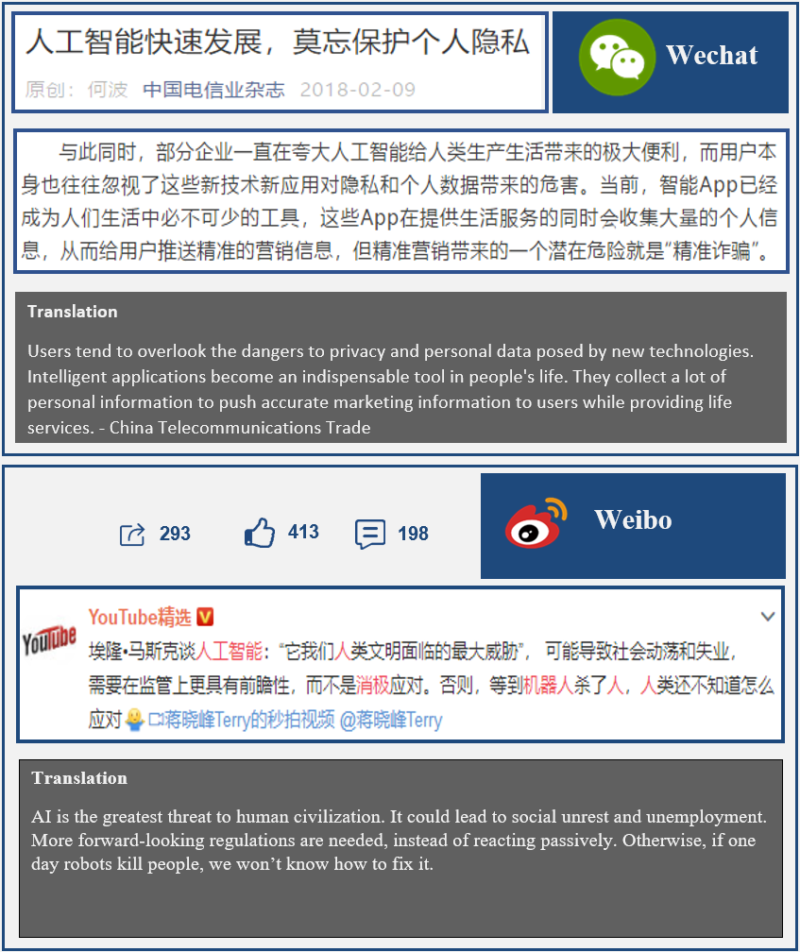
The future of China’s artificial intelligence
China’s artificial intelligence developed exponentially in the last years as a result of an ideal technological, institutional and economic environment. Firstly, the expansion AI technology was made possible strong cooperation between research institutes, the local and the central governments as well as companies interested in investing in China’s AI industry. Secondly, the rapid expansion of China’s AI market is functioning as a catalyst for the many start-ups eager to develop AI products in other enter the lucrative club of AI companies.
At the same time, our research suggests that there is great awareness among netizens about the potential threats of AI technology. For this reason, many internet users believe that China’s AI industries as well as China’s AI market should undergo regular scrutiny to avoid AI companies becoming tempted to use their technology in questionable ways.
Want to learn more about AI in China? Check out our AI in China White Paper.
Let China Paradigm have a positive economic impact on your business
Listen to China Paradigms Podcast in iTunes
